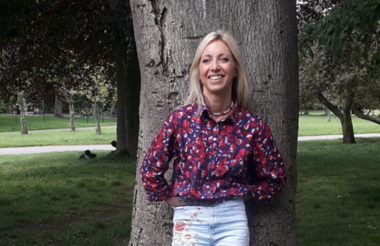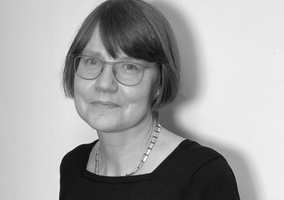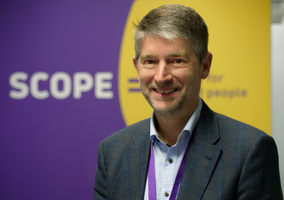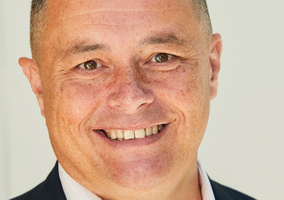There was never a discussion to “start a business or charity”, says Rebecca Friel, co-founder and chief executive of the Manchester-based charity Odd Arts.
While studying drama and theatre at the University of Manchester, Friel heard about the work of the late Augusto Boal, a Brazilian theatre practitioner and politician who created the Theatre of the Oppressed.
His work inspired Friel to use interactive and participant-led theatre to tackle social problems, such as radicalisation and youth violence, and co-found Odd Arts with two friends in 2004.
“When I went to university, I lost a lot of confidence in my abilities because I felt I was surrounded by people with better performance skills, academia and knowledge,” she says.
“But as soon as I heard about this Augusto Boal, I lit up and was like: ‘This is what I want to do with theatre.’”
Starting from scratch
Friel admits that establishing Odd Arts was not smooth sailing and that some errors were made.
She and the other founders originally set it up as a company limited by shares but they soon realised that that was “wrong” and changed it to a company limited by guarantee, which, they later found out, was also “wrong”.
“Then, we had to change to a community interest company and eventually we turned into a charity, which was perfect for us,” she says.
“There have been a lot of lessons learned along the way because I didn’t know anything at all about business, governance or finance. I don’t think we overly considered what we were doing otherwise we’d have been intimidated and probably not done it. It’s been very organic and driven by passion and excitement.”
While setting up Odd Arts, Friel was working as an assistant manager at a restaurant, trying to juggle that job with the volunteer work she was doing in prisons and communities.
She recalls: “I remember how we used to pay each other because we were working full-time jobs and doing this as an extra, trying to make it a full-time job.
“We just waited until there was enough money in the bank account and then split it by a third each. That’s how it went for the first year.”
‘Challenge yourself and feel uncomfortable’
Odd Arts specialises in the delivery of theatre-based programmes that aim to challenge inequalities and increase opportunities for people facing the greatest level of discrimination and disadvantage.
These include therapeutic theatre, which is predominantly delivered in secure settings such as prisons, secure units and hospitals; interactive theatre tours that are developed with people with lived experience and look at issues including racism and exploitation; and creative and community-led social action projects.
With regards to lived experience, Friel points out that she must be “aware of it” in her role.
“I consider myself to have many privileges and lead a charity that works with people with lived experience that I couldn’t possibly understand. That’s something I have to work on absolutely every day and that’s also where you have to learn to challenge yourself and feel uncomfortable.
“I had a childhood that enabled me to build confidence and now I could go and do things where opportunities are accessible. I wasn’t at some private school, I was loved and filled with confidence and wasn’t living in poverty and had a skin colour that let me get into places without discrimination.”
Friel adds that it was “an uncomfortable time” when she realised that it was not just about her being driven and passionate.
“There are many people who are driven and passionate, doing the same things that maybe the world wouldn’t make it as easy for them to set that up. If you’re a leader in the charity sector, you have to work on that all the time.”
Learning to “step back” and delegate
Until a few years ago, Friel was also the secretary and a trustee of her organisation.
She admits that she made some historical mistakes in thinking she could “do it all” and be in everything about Odd Arts.
“I got a mentor, who’s now our chair, and she was a good critical friend because it was me that had been holding the company back at some points. It felt like [Odd Arts] was so within me that it was difficult to let go. It’s almost like if you birthed the organisation, it’s really difficult to separate from you.
“Emma challenged me on some of these things. That was nice because previously, people could see how hard I worked and how much I cared and therefore it felt difficult for them to criticise or challenge me when that’s what I needed because it wasn’t helping the company and the people we work with.”
Friel says that she felt “guilty, embarrassed and uncomfortable with not being on the ground every day”, but realised that it was necessary to step back to allow Odd Arts to thrive.
“We were trying to remove the company from feeling so much about a person who set it up and feeling more like a company that can thrive itself. I used to be involved in everything and do every project and that’s where I got all my pride from.
“Now, I get such pride and joy in seeing other team members create the most amazing projects and work. I love coming to something, thinking: ‘Look at what the company’s empowered people to do!’ You have to have a mind shift in that and be ready to let go of certain things.”
These changes have helped Odd Arts grow “significantly”, according to Friel.
Indeed, total income rose from £287,936 in 2019-20 to £512,102 in 2021-22 and could reach £800,000 this year, she says.
Building financial resilience
Some 18 months ago, Odd Arts established a corporate development committee to help build its financial resilience.
Friel explains that the idea behind the committee was to invite representatives from the corporate sector who would agree to help bring in funding to the charity.
At first, she felt “guilty” and “uncomfortable” asking corporates to support Odd Arts, thinking that they would see the charity as a “nuisance”.
“We didn’t have any core funding for nearly 18 years, so I had just not experienced the fact that support could be given in a way that was less painful to a charity. Now, I see that when funding is given in a way where people want to support the charity we achieve more and give more to society and it’s rewarding for those that give it to us. They’re part of that shared impact.”
Friel says that the corporate development committee has been “a huge success” for Odds Arts, as it brought £30,000 of income, of which £10,000 was unrestricted, in the first year.
“They helped us work out how we could sell to corporates and that’s now a small steady income we can rely on if needed.”
She believes that the charity is “not even close to where it could get in terms of who wants to see our work and what impact it could have” on beneficiaries.
“We’re trying to do so much work around anti-oppression, anti-discrimination, anti-racism and mental health. These themes aren’t going to outdate quickly.”
Related articles












